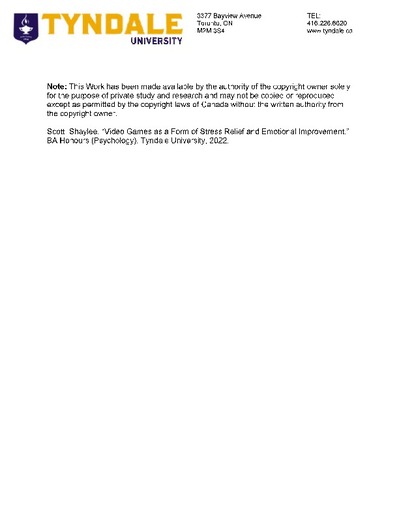| dc.rights.license | Attribution-NonCommercial-NoDerivatives 4.0 International License | en_US |
| dc.contributor.advisor | Henry, Vivette (Advisor) | |
| dc.contributor.author | Scott, Shaylee | |
| dc.date.accessioned | 2022-06-24T17:47:42Z | |
| dc.date.available | NO_RESTRICTION | en_US |
| dc.date.available | 2022-06-24T17:47:42Z | |
| dc.date.copyright | 2022 | |
| dc.date.issued | 2022-03 | |
| dc.identifier.citation | Scott, Shaylee. “Video Games as a Form of Stress Relief and Emotional Improvement.” BA Honours (Psychology), Tyndale University, 2022. | en_US |
| dc.identifier.uri | https://digitalcollections.tyndale.ca/handle/20.500.12730/1573 | |
| dc.description | Bibliography: leaves 51-61 | en_US |
| dc.description.abstract | The potential risk factors and benefits of video games have been a topic of interest in psychology for quite some time (Anderson & Carnegey, 2009; Bushman & Gibson, 2011; Granic et al., 2014). This research study addressed the question as to whether video games can be emotionally beneficial to the ones playing them. It was hypothesized that relaxing games, when played over time for healthy periods of time, would help to significantly improve moods and lower stress levels. To test this hypothesis, participants completed measures of their positive affect, negative affect, and stress levels prior to and after one week of daily sessions of gaming. The game used for this study is known as “Stardew Valley” (Barone, 2016). As hypothesized, the results indicated a significant increase in positive affect, as well as significant decreases in negative affect and stress after the gameplay period. However, further research is required to observe whether there is a causal relationship between gaming and significant emotional benefit. | en_US |
| dc.format.extent | 68 leaves | en_US |
| dc.format.mimetype | application/pdf/ua | en_US |
| dc.language.iso | en | en_US |
| dc.publisher | Tyndale University | en_US |
| dc.rights | Copyright, Shaylee Scott, managed by Tyndale University. All rights reserved. | en_US |
| dc.rights.uri | https://creativecommons.org/licenses/by-nc-nd/4.0/ | en_US |
| dc.subject.lcsh | Video games--Physiological aspects | en_US |
| dc.subject.lcsh | Relaxation | en_US |
| dc.subject.lcsh | Stress (Physiology) | en_US |
| dc.subject.lcsh | Stress management | en_US |
| dc.subject.lcsh | Mental health | en_US |
| dc.subject.lcsh | Tyndale University–Thesis | en_US |
| dc.subject.other | Theses, Academic--OWOOBC--Tyndale University | en_US |
| dc.title | Video Games as a Form of Stress Relief and Emotional Improvement | en_US |
| dc.type | Thesis | en_US |
| dc.contributor.affiliation | Tyndale University | en_US |
| dc.contributor.committeeMember | Henry, Vivette (Committee Member) | |
| dc.contributor.department | Department of Psychology | en_US |
| dc.contributor.repository | Tyndale University, J. William Horsey Library, 3377 Bayview Ave., Toronto, ON, M2M 3S4, Canada. Contact: repository@tyndale.ca | en_US |
| dc.identifier.bibrecord | https://tyndale.on.worldcat.org/oclc/1312741297 | en_US |
| dc.rights.holder | This Work has been made available by the authority of the copyright owner solely for the purpose of private study and may not be copied or reproduced except as permitted by the copyright laws of Canada without the written authority from the copyright owner. | en_US |
| dc.subject.keyword | Video games | en_US |
| dc.subject.keyword | Stress relief | en_US |
| dc.subject.keyword | Emotional improvement | en_US |
| dc.subject.keyword | Relaxation | en_US |
| dc.subject.keyword | Mood | en_US |
| dc.description.note | For AODA accommodation, including help with reading this content, please contact repository@tyndale.ca | en_US |
| dc.degree.level | Bachelors | en_US |
| dc.degree.name | Bachelor of Arts Honours (BA Honours) | en_US |
| dc.description.degree | Thesis (BA Honours)—Tyndale University, 2022 | en_US |


